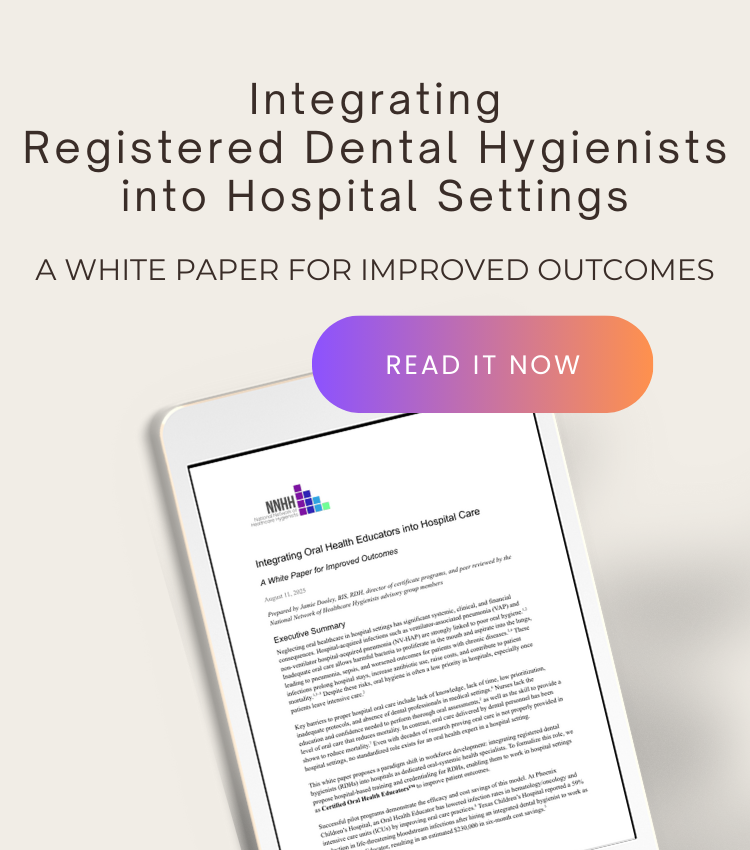
Does Accreditation Matter After Hygiene School?
Sep 12, 2024Remember how stressed out our dental hygiene instructors were in school when it was a CODA year? Updates and changes had to be made to the program to continue to achieve accreditation. Continuous Quality Improvement (CQI) is an important measure of excellence in secondary education, but what about after hygiene school? Shouldn't hygienists be offered the same level of excellence in continuing education options?
The word "accredit" means: (of an official body) give authority or sanction to (someone or something) when recognized standards have been met. Therefore an accredited program offers consumers and stakeholders assurance. Accreditation assures that organizations are competent and their results can be relied on.
As the profession of dental hygiene moves toward greater autonomy and increased career options, the number and type of continuing education (CE) is also increasing. As more RDHs practice with loose or no supervision (clinically or non-clinically) the matter of quality continuing education is of higher importance than ever before. And as dentistry and medicine are finally blurring the lines of where one begins and the other ends, how are we supposed to keep up with all of the oral-systemic implications in every area of medicine?
Understanding the difference between approved CE and advanced education for career growth
Only organizations can become an "approved provider of CE" and the organizations that approve them to do so are ADA, AGD, and AADH, all with their own unique standards. Individual programs are not approved or accredited, and individuals cannot become approved providers. An individual that wants to offer approved CE can form a joint providership with an organization that is approved, but again, the individual courses or programs are not vetted by a third party.
For live CE (synchronous), earning a "CE Certificate" requires attendance only. No assessment of whether learning outcomes (objectives) were met is required. For asynchronous learning (recorded, online, journal based), one must answer a few questions to earn credit, but the quality of the questions or score on the quiz does not have any specific standards.
Advanced education, such as a degree, certificate program or certification, requires students to complete a prescribed course of study and pass a criterion-referenced assessment of learning. Completion of the program is often publicized with credentials after one's name. These credentials cannot be created by the graduate of the program, they must come from the organization that awarded the diploma or certificate of completion, which protects consumers from fraudulence. As online certificate programs gain traction, the dental hygiene profession is seeing an increase in options that have the potential to advance careers and help participants transition beyond traditional roles.
Look for accredited programs
An accredited program has been externally audited against a set of industry standards that measure quality assurance, by an organization that is itself also accredited, showing compliance to a set of standards. According to the American National Standards Institute (ANSI), "Accreditation provides formal recognition to competent organizations. It provides a conduit for regulators and industry to find reliable products and services to meet their specific needs. Most important, accreditation assures industry and government decision-makers that accredited organizations are competent and their results can be relied on."
Any individual or organization can offer a certificate program or certification (learn the difference between them HERE), without meeting any standards, which is scary for consumers. While online programs are attractive to adult learners due to their self-paced, learn from anywhere format, and the fact that recorded lectures can be listened to as many times as needed, the quality of the content, instructor(s) and assessment are only guaranteed if it has been accredited.
How to find an accredited program for RDHs
When searching for accredited programs offered to licensed dental hygienists, an internet search typically results in schools of dental hygiene. To get better results, do not search "accredited dental hygiene programs." Instead search "accredited certificate and certification programs for RDHs." That will begin to pull results that are more specific to hygienists that are already licensed, and are looking for an education program between a degree and approved CE.
Understanding the standards
The standards set for approved CE courses in dentistry are different than standards set for advanced education. National and global standards for certificate programs and certifications have been in place for many decades, but dentistry has not been following them. In the words of the great, late Maya Angelou, “Do the best you can until you know better. Then, when you know better, do better.”

National Network of Healthcare Hygienists (NNHH) was the first organization in all of dentistry to offer approved CE and to earn accreditation by the ANSI National Accreditation Board (ANAB) by coming into compliance with the global standard ANSI/ASTM E2659-18 for certificate programs. ANAB accredits individual programs, not organizations, offering a higher-level of quality assurance to stakeholders. NNHH founder Jamie Dooley felt it important to leverage the reputation of ANAB as NNHH certificate programs prepare hygienists to educate and collaborate with medical providers, and hospitals already use and respect ANSI as an accreditor.
"When I started NNHH I was coaching hygienists that felt a tug on their heart-strings to do more. I heard over and over from them that they were taking far more CE than required, trying to piece together information so that they could help a specific demographic achieve oral-systemic health. We all have a group of people we are passionate about helping! It became clear to me that if hygienists could formally gain specialized knowledge from each other, we would move our profession forward at an astounding rate. Everyone I spoke to was craving the in depth level of learning they had in hygiene school, but needed affordability and flexibility built in. They wanted to advance their education in a way that increased their confidence (such as earning a credential) and they also loved sharing the specialty knowledge the gained. They just needed a platform that offered them everything in one place, so we built it, and hired the best educators and speakers in our field to instruct the modules," Dooley said.
Most RDHs who desire specialty knowledge in a specific topic scour the internet and and read scholarly journal articles with no proof or credential of their advanced education. The nursing profession had the same issue and their answer was accredited certificate programs and certifications by trusted national organizations. Now, nurses educating nurses and sharing their specialty knowledge with each other to advance the profession is the norm, and career options have increased as a result.
Passionate RDHs who want more than to earn more than the minimum number of approved CE are tomorrow's leaders of specialty care in dental hygiene and dental/medical integration. They deserve an array of accredited programs to choose from.
Look for collaborations and partnerships between reputable organizations
Oftentimes quality programs involve collaboration between respected individuals and organizations, putting the hygienist's needs above the financial benefit of any one entity.
"We welcome any individual or organization that would like to explore collaborating with us to offer an accredited program to reach out. Accreditation is time-consuming, expensive and stressful. We are willing to explore partnerships so you can leverage our knowledge and accomplishment and get your idea out there much faster. We put collaboration over competition," Dooley noted.
Connect with NNHH at https://healthcarehygienists.org or [email protected]






